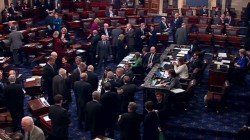Politics
The Public does not agree with the ‘clean’ debt deal
 A new Rasmussen Report poll shows that the American public is not in favor of raising the debt ceiling without substantive spending cuts in the federal budget. In fact, the public supports more substantial cuts than they did during the government shutdown.
A new Rasmussen Report poll shows that the American public is not in favor of raising the debt ceiling without substantive spending cuts in the federal budget. In fact, the public supports more substantial cuts than they did during the government shutdown.
57 percent of respondents believe that the “best approach for dealing with the debt ceiling issue is to only raise it as part of a deal that includes significant spending cuts.”
11 percent supported no increase in the debt ceiling, something that would have caused the federal government to default on its debt. Also, 19 percent said that default would be good for the American economy in the long-run.
The Washington Examiner reports “Fans of greater spending cuts, however, seem fatalistic about lawmakers and their promises. Just 5 percent said that long-term spending cuts are likely. Some 71 percent said that a deal to make significant cuts is unlikely.”
This poll surveyed 1,000 likely voters. It was conducted on February 10-11, and the margin of error is +/- 3 percentage points. Pulse Opinion Research, LLC, conducts all fieldwork done for Rasmussen Reports.
These findings are not atypical for economic polling, as the American public has consistently sided with fiscal conservatism historically.
Many were expecting the debt ceiling fight to be a more drawn out process. The GOP folded fairly easily during debt ceiling talks, and surprisingly enough, the House of Representatives did not put up much of a fight at all.
28 Republicans joined the 193 Democrats who voted to raise the debt ceiling, bringing the yes vote total to 221. 201 Representatives voted against raising the debt ceiling. The vast majority of no votes were from Republican Congressmen. Only 2 Democrats voted against the measure.
It is very likely that the GOP wanted to avoid any negative press regarding the debt ceiling. It was assumed that at least some minor spending cuts or military pension raises would be the bare minimum qualifications needed for Republican support to raise the debt ceiling.
The GOP was widely blamed for the government shutdown during the fall of last year, and even though the American public sides with Republicans on fiscal matters, the mainstream media surely does not.
The media firestorm that would have resulted from a government default would have hurt the Republican brand going into the 2014-midterm elections.
The president refused to even negotiate any spending measures surrounding the debt ceiling issue, and held firm on his stance that the federal government needs a ‘clean’ raise. It was an uphill battle going into the debt ceiling debate for Republicans, and even with the public on its side, it gave in quite easily.






